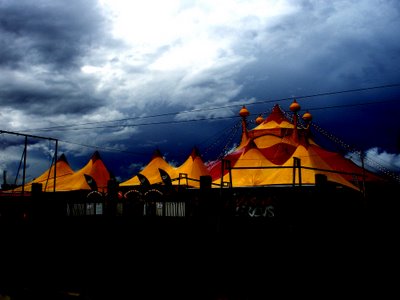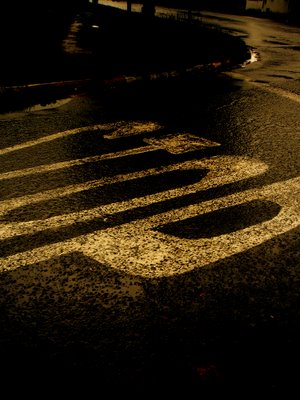
Jitters
by Jim Kunstler
March 20, 2006
An acquaintance told me a weird story yesterday. Let's call him "E." He runs an Internet consulting company here in Saratoga Springs. It employs about twenty-five people in a downtown building E put up a few years ago.
Last month a freak windstorm ripped through here and took down the electric power for three days. E lost communication with the payroll service (a separate company) that issues his employee's salaries. The storm happened in the middle of the day, Friday, payday.
The power came back on Sunday night, and on Monday two of E's employees each asked for private meetings with the boss. Because of the storm, they said, the payroll company had failed to make electronic salary deposits in their checking accounts. They were concerned because they were late on their mortgage payments and without the past week's electronic paycheck, they couldn't pay their mortgages.
E told me that these were "high-level employees" with substantial salaries who were both living in "very high-end homes," which around here would mean around a half-million dollars (and I know that in some parts of the US, like Washington, DC, or San Francisco, a half-million barely gets you a "pre-owned" raised ranch). He said he was shocked to discover that his executives were living from paycheck to paycheck, in houses that by normal criteria (i.e. pre-bubble standards) they probably couldn't afford.
"What if something happened to me?" E said. "What if I was hit by a bus? That would be it for the company. That would be the end of their paychecks, and what if they didn't find another job almost immediately? I don't want to interfere in their personal affairs, but I can't help feeling that I really need to talk to them about this."
Meanwhile, our cretinous, pandering local newspaper, the Saratogian, published a special real estate section on Sunday under the banner "Progress 2006." The headline under the banner said, "If You Build It They Will Come," and the accompanying photo showed a rank of beige McHouses in a new subdivision. The sub-head said "Growth is the name of the game across the county."
Spring here in the North Country brings with it a ripe expectation that the winter real estate doldrums will soon yield to raptures of zippy sales. Of course this is based on the assumption that the year ahead will be like the recent years just past, only better! The sense of momentum in the real estate markets is reinforced by the fact that so much stuff has worked through the arduous permitting process and is just now coming up for sale, with even more stuff behind it moving through the cloacal pipeline, so to speak -- so therefore the buyers will automatically appear drooling into their checkbooks.
I don't think so. I think that what we are getting here is stupendously delusional behavior. The ebullience in the newspaper only tells me how much unexpressed subconscious terror lurks just below the surface of wished-for "normality." For one thing, anybody who walks around this town can hardly fail to notice how the realtor's signs are accumulating in the front yards. Nothing's moving. Outside of town, in the suburban asteroid belts that only ten years ago were cornfields and cow pastures, there's a much more lavish supply of new houses. I detect an odor of bloodshed.
This has been a hot market for a while, because Saratoga is an historic "main street" town in pretty good condition with a high level of cultural amenity, close to the gigantic Adirondack Park. The three old cities nearby which comprise the employment centers of the Capital District -- Albany, Schenectady, and Troy -- are in such a state of squalid decrepitude that practically anyone gainfully employed has fled shrieking lately, and Saratoga has attracted many willing to tolerate a 30-plus mile commute.
For years following the two oil crises of the 1970s, the real estate market in Saratoga fell stone dead because the fear of rising gasoline prices and long lines at the filling stations remained so vivid. We're headed back to scary gasoline prices again, only this time it will not be a temporary crisis. And this time, there will be a huge surplus of unsold houses. There will also be a substantial number of house owners getting in trouble with their mortgage payments, and one way or another their houses may end up adding to the supply of available houses. There is also very likely to be trouble in the financial markets, with dark implications for the value of the US dollar, for the movement of interest rates, and for the availability of further credit.
It makes my head hurt to imagine the coming carnage on the real estate scene here. Nation-wide, the latest figures are not reassuring. Even hot markets cool off when evil economic winds blow. According to the California Association of Realtors, sales of existing, single-family detached homes were down 24.1 percent, the highest year-on-year decline since December 1990 when sales dropped 25.2 percent. The National Association of Realtors reports Massachusetts home sales are down 21 percent and listings up 41 percent. In Florida existing home sales are down 19 percent. In Alabama existing home sales down 21 percent and listings up 17 percent. Pennsylvania sales down 17 percent. Minnesota sales down 7 percent and inventory Up 35 percent.
Meanwhile housing "starts" (under construction) jumped 14.5 percent in January of 2006. Permit approvals were up 6.8 percent. That old dawg, momentum.
House "affordability" reached a 14-year low according the US Department of Commerce. Foreclosures were up 27 percent so far in 2006.
You wonder, finally, how many current homeowners will lose their houses? How many developers will lose the shirts off their backs? How many banks will get stuck with foreclosed property? And how will the United States economy function without a phony-balony real estate bubble market driving it?

Was The War Worth It?

As the third anniversary of the beginning of the Iraq War approaches, TIME asked leading thinkers around the world to weigh in on the question at the heart of the ongoing debate about the controversial conflict.
Posted Thursday, Mar. 16, 2006
This is the first installment of a feature that will appear in the forthcoming issue of TIME.
David Kennedy, Professor of History, Stanford University:
No. From the outset the war was a colossally bold and breathtakingly risky gamble. Unfortunately, and unsurprisingly, the United States has failed to beat the odds. Forget about WMDs and links to al-Queda as rationales for the war. The real purpose for invading Iraq was the extravagant ambition to transform the political culture of the entire Middle East. The Bush administration bet American might and good intentions against the accumulated weight of centuries of religious rivalry, tribal tensions, wanton bloodletting, and authoritarian rule. Even American hyper-power has proved no match for the burden of all that sorry history.
Hisham Kassem, Egyptian democracy activist:
Sadly, I have to say yes. It is difficult to commend such a bloody scene. But it achieved something useful. Parallel to the chaos and bloodshed, there is a political process evolving in Iraq. Bloodshed is the price of the transition from Saddam’s psychopathic dictatorship. The losses would have been higher had Saddam stayed on. You could easily see that regime lasting for another 30 years, under his sons and top generals. Negotiating with Iraq was not an option. There had to be a military intervention. You have a block of 22 countries in the Arab world dominated by authoritarianism and dictatorship. It is not a block you could engage politically and pressure for reform. By military intervention, the U.S. is able to pressure the region into the reforms we are beginning to see across the region that might avert many countries from becoming failed states. The world cannot put up with state failure in the back yard of the world’s oil fields, Israel and Europe.
Lawrence B. Wilkerson, Colonel, U.S. Army (ret.); former chief of staff for Secretary of State Colin Powell:
No. I'm principally a strategist and from that perspective the war has been a disaster. First, the foremost winner has been Iran: it rid itself of its greatest threat, Saddam Hussein and his military, without firing a shot; won the December 15 Iraq elections; owns the south, particularly Basra; and has felt the freedom to elect Mahmoud Amadinejad who, in turn, has felt the freedom to reclaim leadership of radical Islam, leadership Osama bin Laden claimed on 9/11.
Second, the foremost loser, after Iraq itself, has been Israel, whose leaders must now fear more than ever before the new strategic maneuver room afforded Iran by America's ineptitude.
Third, the general war against global terrorists has been affected greatly by the failure in Iraq. Recruiting among Muslim ranks has been aided significantly, while America has squandered the upper hand in the world of ideas, which is the real battlefield of this conflict. Lastly, if our failure in Iraq produces regional conflict, we will find ourselves expending far greater blood and treasure to stabilize the situation once it gets completely out of hand. And the odds that it will get completely out of hand if we continue on the present course are quite high.
Tommy Franks, General, U.S. Army (ret.); as chief of U.S. Central Command, Franks oversaw the invasion and the three months following it, until his retirement on July 7, 2003:
Yes. America remains very proud of, and very thankful to our sons and daughters serving in Iraq and around the world in the cause of freedom. The events of 9-11-01 taught us a valuable lesson.... ignoring terrorism will not make the problem go away. The sacrifices of our military members and their families are giving Iraqis a chance for freedom. And a free Iraq serves not only Iraqis... it will stand as a model in the Middle East. A model that represents to millions of people that there is an alternative to terrorism.
No comments:
Post a Comment